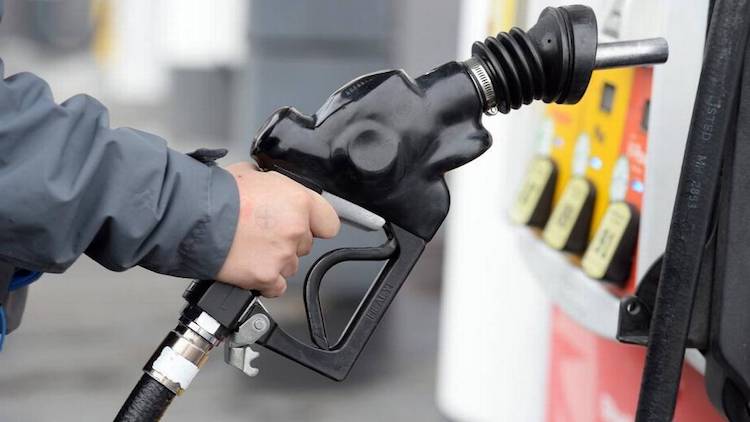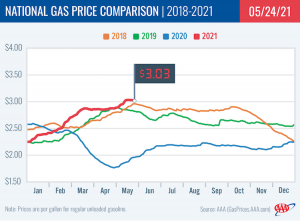- Home
- The Arizona News
- Memorial Day Travelers Expect to Pay Highest Gas Prices Since 2014

Memorial Day Travelers Expect to Pay Highest Gas Prices Since 2014
Motorists hitting the road this week to celebrate the kick-off to summer will be greeted with the most expensive Memorial Day weekend gas prices since 2014. The national average has stabilized following the Colonial Pipeline cyberattack, but pump prices are likely to fluctuate leading up to the holiday weekend. Over the past weekend, the national gas price average declined a penny to $3.03, the first decrease in two weeks. While barely cheaper on the week, the average is 17 cents more than last month and $1.12 more expensive than last year.
“AAA expects 37 million Americans to travel, mostly by car and plane, for the Memorial Day holiday weekend. That is a 60% increase over last year’s holiday and a strong indication that summer travel is going to be largely popular,” said Jeanette McGee, AAA spokesperson. “With the increase in travel demand, gas prices are going to be expensive no matter where you fill up, so plan ahead. The AAA app can help to find the best price.”
While the Colonial Pipeline is back in operation and deliveries are in progress, some stations in the southeast continue to experience supply strain. This is likely to extend into the holiday weekend, but motorists will be able to fill-up.
“Holiday road trippers may come across some gas stations with low fuel supply in popular travel destinations, like beaches, mountains or national parks. However, markets are not expected to be fuel-less, like we saw in the wake of the pipeline shutdown,” added McGee.
AAA offers these road trip tips for Memorial Day travelers:
- Get your battery, engine and tires checked.
- Consider refueling when your gas tank level hits ¼ of a tank.
- Fill up before arriving at your vacation destination. Gas prices are likely to be cheaper outside of popular travel destinations.
- Use your AAA app to find the closest gas station on your route. You can always call ahead to confirm their pumps are flowing.
- Do not leave home without an emergency roadside kit. Include a mobile phone and car charger, first-aid kit, blankets, drinking water, a flashlight with extra batteries, a basic toolkit, warning flares and jumper cables. Don’t forget extra snacks or meals, as well as cleaning supplies, including disinfecting wipes.

Quick Stats
The nation’s top 10 largest weekly changes:
Hawaii (+4 cents)
Indiana (-4 cents)
California (+3 cents)
Oregon (+3 cents)
Colorado (+3 cents)
Maryland (−3 cents)
Georgia (−3 cents)
Oklahoma (−3 cents)
Illinois (−3 cents)
Wisconsin (−2 cents)
The nation’s top 10 least expensive markets:
Louisiana ($2.71)
Mississippi ($2.71)
Missouri ($2.73)
Texas ($2.74)
Oklahoma ($2.75)
Arkansas ($2.76)
Kansas ($2.83)
Minnesota ($2.83)
Alabama ($2.83)
North Dakota ($2.84)
Memorial Day Holiday Travel to Rebound to More Than 37 Million
AAA Travel expects a significant rebound in the number of Americans planning to travel this Memorial Day holiday weekend. From May 27 through May 31, more than 37 million people are expected to travel 50 miles or more from home, an increase of 60% from last year when only 23 million traveled, the lowest on record since AAA began recording in 2000.
The expected strong increase in demand from last year’s holiday, which fell during the early phase of the pandemic, still represents 13%—or nearly 6 million—fewer travelers than in 2019. AAA urges those who choose to travel this year to exercise caution and take measures to protect themselves and others as the pandemic continues.
“As more people get the COVID-19 vaccine and consumer confidence grows, Americans are demonstrating a strong desire to travel this Memorial Day,” said Paula Twidale, senior vice president, AAA Travel. “This pent-up demand will result in a significant increase in Memorial Day travel, which is a strong indicator for summer, though we must all remember to continue taking important safety precautions.”
Another factor contributing to the expected increase in travel this holiday is the Centers for Disease Control and Prevention’s (CDC) recently updated guidance that fully vaccinated people can travel domestically at low risk to themselves, while taking proper precautions. It’s important to keep in mind that some local and state travel restrictions may still remain in place, however.
For travelers who are not vaccinated but choose to travel, CDC recommends that you practice social distancing, wear a mask, wash your hands and get tested before and after travel. Whether you are vaccinated or not, remember masks are required on planes, buses, trains, and other forms of public transportation traveling into, within, or out of the United States and in U.S. transportation hubs such as airports and stations.
Huge Increase in Air Travel Expected, but Most Memorial Day Travelers to Take Road Trips
With 34 million Americans planning Memorial Day road trips, auto travel is expected to increase 52% compared to 2020. Nearly 12 million more Americans will travel by car this holiday than in 2020, though this is still 9% less than in 2019. More than 9 in 10 Memorial Day travelers will drive to their destinations, as many Americans continue to substitute road trips for travel via planes, trains and other modes of transportation.
After a historically low year of air travel in 2020, this Memorial Day will see nearly 2.5 million Americans boarding airplanes, nearly six times more than last year (+577%). Still, 750,000 fewer people will take to the skies this holiday compared to 2019.
Meanwhile, just 237,000 Americans are expected to travel by other modes, including bus and train, this Memorial Day. This is the second-lowest volume on record, higher only than the 185,000 who traveled in 2020. In 2021, travel via these modes will be 88% below 2019 levels.
Drivers Beware: Worst Times to Hit the Road
INRIX predicts drivers will encounter the longest travel delays before the holiday weekend, particularly during the afternoons on Thursday, May 27 and Friday, May 28. Drivers in several major U.S. metros could experience double the travel times compared to a normal trip.
“Although vehicle trips are down as much as 40% in some metros, afternoon congestion is nearly back to pre-pandemic levels. With the increase of holiday travelers to the typical afternoon commute, drivers in the larger metros should expect longer delays heading into the holiday weekend,” said Bob Pishue, transportation analyst, INRIX. “Travelers should anticipate delays to start on Wednesday and continue through Memorial Day. Our advice to drivers is to avoid the evening commute times and plan alternate routes.”
